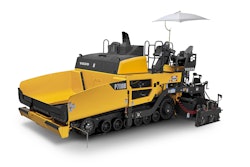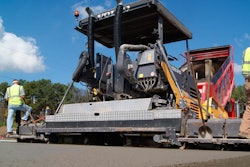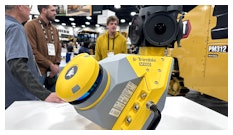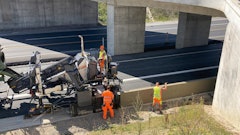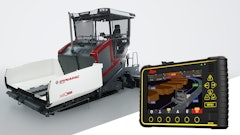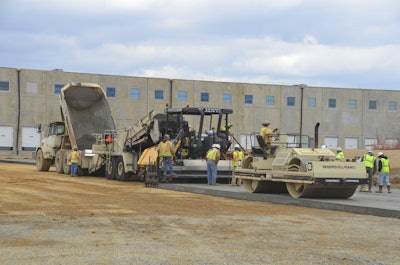
Along the Appalachian Mountains from the Canadian-US border to Tennessee runs Interstate 81 (I-81). Stretching for 855 miles, the route carries over 12% of the nation’s gross domestic product, and has subsequently been named the “trucker’s highway.” In recent years, hundreds of distribution warehouses have sprouted along this heavily trafficked corridor as Americans shift to online buying and demand shorter delivery times.
Don Smith, president of Hanover, PA-based Conewago Enterprises Inc., observed this construction trend more than a decade ago, and introduced an attractive paving option to the regional market – roller-compacted concrete (RCC).
“About 15 years ago, we started experimenting with RCC as an alternative to asphalt paving,” Smith explains. “At the time, oil prices were on the rise, so we were looking for other material options and found RCC to be a very suitable substitute for the types of projects we were completing.”
The three main advantages of RCC are its cost effectiveness, durability and capability to span over the poor soil conditions often encountered in the mid-Atlantic region. It is made from a mix of Portland cement, aggregate and water that is classified as zero slump due to a very low water content.
RCC produces a rigid pavement, with customers seeing lifespans of more than 20 years. Because the application is similar to asphalt paving, it is applied with a conventional or high-density paver and the mix is tamped with vibratory steel or rubber-tire rollers after it is placed.
High Density Required
When Conewago first starting placing RCC, a standard asphalt paver and asphalt compactors were used. However, it didn’t take long for Smith and his team to realize they weren’t the right tools. “We quickly figured out that the European-style high-density pavers with dual tamper bar compaction were the only way to put down RCC,” he says.
Conewago turned to the Volvo ABG7820C high-density paver with a variable-width screed that extends up to 30 ft. When coupled with the vibratory double tamping bar, the screed allows Conewago to place material faster while achieving compaction normally completed by large rollers. The added paving width also eliminates the number of joints, which reduces long-term maintenance needs.
RCC quality essentially comes down to density. The industry standard is 98%, and the ABG7820C paver has the ability to hit 90% to 95% right out of the paver, reducing the amount of rolling needed to reach the 98% target. The double tamper bar on the screed then strikes off the RCC material and gives it a smooth surface, allowing for additional compaction effort.
A drawback of RCC over asphalt is its reputation for a rougher ride at higher speeds (over 40 mph). However, the ABG7820C paver works in conjunction with a Topcon Millimeter GPS grade control system to optimize smoothness.
“When we were looking for a larger paver, we compared Volvo and its competition,” says Smith. “Our crew was more than familiar with ABGs, and definitely noticed the difference in smoothness... That combined with the high-quality finish and durability meant the Volvo was the natural choice.”
Growing Demand
RCC’s resilience and cost benefits have gained interest from the Pennsylvania Department of Transportation (PennDOT). Conewago is participating in a PennDOT pilot program to test RCC and traditional asphalt for a section of residential roadway in Adams County.
While asphalt indexes are dropping in tandem with oil prices, Smith foresees that RCC will continue growing. “We expect the demand for RCC to grow exponentially as more distribution customers see its total value, especially as oil prices start to rise again,” he says.
Despite still being a relatively new product on the market compared to asphalt, RCC has already proven a hit in various industries, such as rail and manufacturing and distribution. In 2014, Conewago was approached by Liberty, an $8.2 billion real estate investment trust, to help build a new 1.7 million-sq.-ft., $93 million distribution center. Situated along I-81 in Shippensburg, PA, the project involved placing RCC on a 140-acre parking area. Using the ABG7820C paver, the project was completed on time and to the high standard Liberty demanded.
Over a four-month period, Conewago placed more than 45,000 cu. yds. of RCC on the site. The building now stands as one of the largest commercial warehouses in the U.S. and one of the largest tilt-up concrete structures in the world.



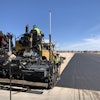
![[VIDEO] Volvo Tire 4 Final Asphalt Pavers Built to Last Decades](https://img.forconstructionpros.com/files/base/acbm/fcp/image/2016/03/default.56f43e6af0e89.png?auto=format%2Ccompress&fit=crop&h=167&q=70&w=250)
